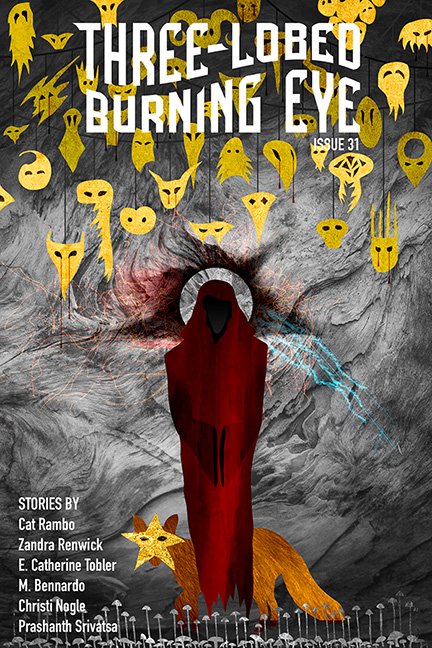At the End of the Song, a Ghost is Waiting
by Cat Rambo
804 words
© 2020 Cat Rambo
That was the first problem, which led to the interstitial refrain about a woman with a name and mind of her own. Though he was spiteful and never did put her name into it anywhere. And yes, that was spite, pure spite, because she’d told him how much she hated those songs where the women were just things and didn’t even get names other than honey and sweetheart and darling.
The ghost moves restlessly. Its mouth gapes. There is a shimmer of ice-sharp teeth, a smile cut out of stars, a waiting throat like a dark void.
He wrote the second verse in the hospital, after his vasectomy. By then he’d married her, this woman, and he didn’t want her to birth anything but his music. Because every time he looked at her, it seemed like a song got beamed straight out of her and into his head. That was why he had told her to stop working, after the songs started making a lot of money. He said the money was both of theirs, that she inspired the songs. But she didn’t smile at that, just said, you say the money’s mine, but the songs sure aren’t.
Those words led into that refrain again. Once again he withheld her name because women come and go. Putting her name in the song would have been like having it tattooed on him, something he’d either have to live with or pay a lot of money to have expunged. And even if he got rid of it later, it’d always be there, lurking at the edges. Like the ghost is now.
He doesn’t look at it, the ghost. He thinks that if it knows he can perceive it, it may not hold still any longer.
The refrain dies away. This is the third verse, the verse after they’d had a fight and she’d walked out the door. He could have gone after her, could have been a cliché and yanked her back, bruised her, become that cliché country-western batterer. At least he knew better than that.
Maybe he’d been a little afraid she’d hurt him back, he might have admitted if he’d been honest. Sometimes you look for pain when you’re angry, because you feel like the two forces will extinguish each other, flame and water, matter and anti-matter. Or maybe it was just that by then he knew words were the way to hurt her most.
The end of the song is coming. The ghost is waiting, blue with cold. Blue with loneliness. Blue as the shine of an empty promise. Blue as eternal love.
Oh that refrain. He wishes now it was nothing but her name, over and over and over again. It is not, but her name is there somehow, pushing up against the words that refuse it. Why, when we are hurting, is our first impulse to give that pain away? No matter how much we hand off, it stays with us.
In the fourth verse, he’d known he was telling things that were not his to tell. He couldn’t pretend that he hadn’t known. He couldn’t pretend that a part of him hadn’t thought today’s phone call would come. That she’d give way under the blows that someone else might think slight, but that had been aimed precisely, delicately, to splinter her soul. Shatter her. What had he thought would happen?
The refrain will be repeated twice after this verse. And then the song will die away. He dreads it; he welcomes it. At least then this tension will be over.
Why did he deny her that name? She’d called him by his, never a nickname, never some epithet. His name, spoken in love, spoken in anger. His name, which she would not speak again. Did she say it while she was dying, slipping away by her own hand? And hadn’t it been his hand, directing it from afar?
The refrain starts a second time. Oh her name her name.
And then the last note of the song dies away and then the ghost speaks as it slices him to pieces, sharper than knives, more intense than any laser, and all of him is undone and all that’s left is a ghost, whispering her own name into the silence, calling herself home. Calling herself home.

